The firearm laws in the United States are not a one-size-fits-all solution. Although the federal government lays the groundwork, each state establishes its own rules around gun ownership, purchasing, carrying, and storage. These differences among states can be perplexing, even to experienced gun owners.
If it’s a first time for a buyer, a lifelong gun owner, or moving across state lines, knowing the state laws is extremely important. What’s legal in one state could be illegal in another.
This guide simplifies how firearm laws vary across the country. This isn’t legal advice — it’s meant to be a practical guide for getting you started. So let’s start.
Firearm Laws in the U.S.—What You Should Know
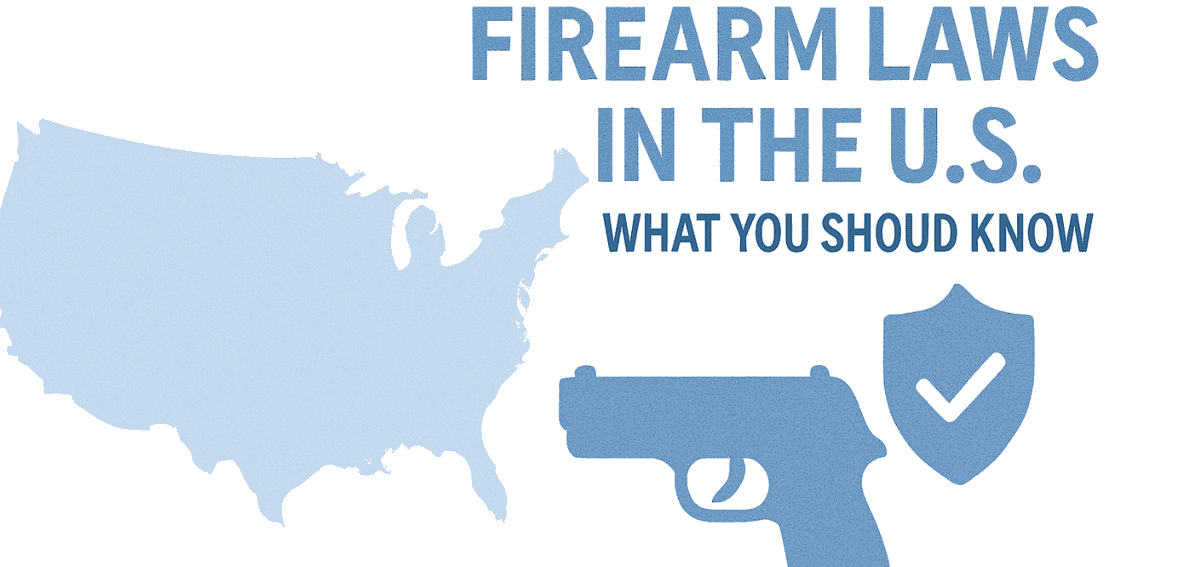
In the United States, two levels of authority shape gun laws — federal law and state law. Federal laws are effective across the United States and set up a national standard of regulation. Some states can then expand on or restrict even further, resulting in broad legal disparities depending on where you live or travel.
The key laws at the federal level are:
- Universal background checks via the National Instant Criminal Background Check System (NICS) for purchases from licensed dealers.
- A ban on gun ownership for felons, people with domestic violence convictions, and people declared mentally unfit.
- Minimum age: 18 for rifles and shotguns; 21 for handguns.
Yet state laws can take things a step further. Some mandate permits for each gun purchase, while others permit private sales without background checks. Some states prohibit such high-capacity magazines, while others do not restrict them at all.
What’s permissible in Arizona may be illegal in California. A permit in one state may not transfer to another. That is why it is crucial for responsible gun owners to have a grasp of the layered legal framework.
Key Gun Law Categories That Vary by State
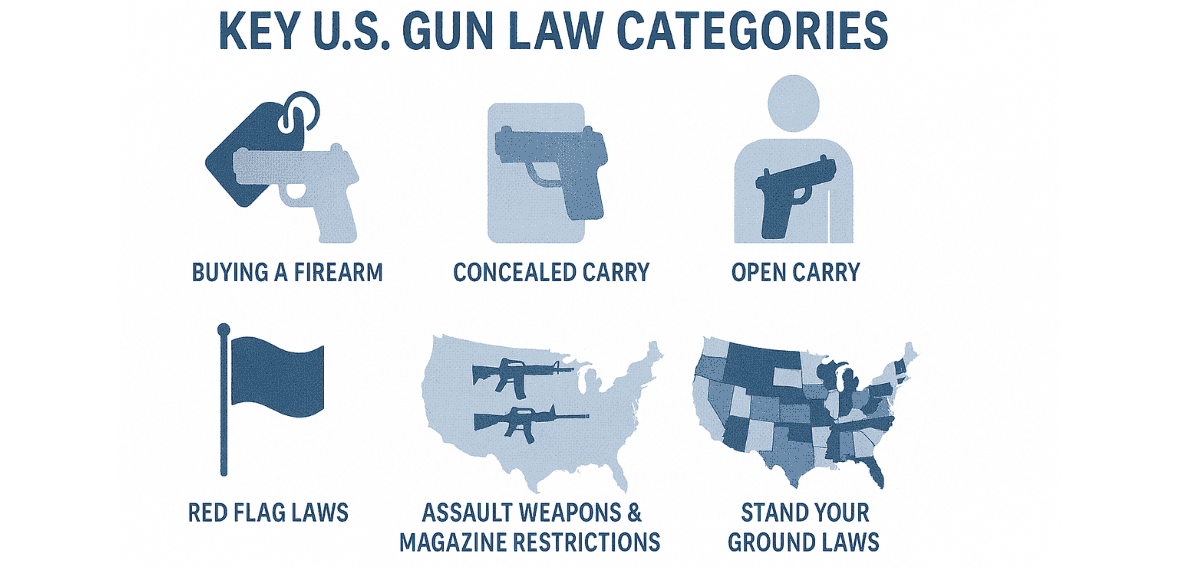
Every state has a different approach to regulating firearms, and minimum age requirements are also different. Where one state restricts guns or their carry, another allows them with few, if any, limitations. Here are the core categories of laws that vary widely:
Buying a Firearm
Some states require:
- A purchase allowance (e.g., Illinois, Massachusetts).
- Minimum waiting periods between purchase and pickup (e.g., California, Hawaii).
- A firearms safety class is required before purchasing a gun.
- Some allow same-day purchases with a background check.
Concealed Carry
All 50 states permit concealed carry, but under varying rules:
- Some allow permits only for those who receive training and undergo background checks.
- Resident permits for states with permitless carry (e.g., Texas, Tennessee).
- Reciprocity is not uniform: Your permit may not be valid in another state.
Open Carry
Open carry laws are even more variable:
- Other states permit open carry without requiring permission.
- Others prohibit it entirely or only on some types of guns.
- Urban centers often have separate limitations.
Red Flag Laws
Red flag laws permit authorities to temporarily remove firearms from an individual considered dangerous. Not all states have enacted these laws. In states where it has been adopted, family or law enforcement can apply for a court order to intervene.
Assault Weapons & Magazine Restrictions
- Assault-style firearms and high-capacity magazines have been banned in states like California and New York.
- Others, such as Arizona or Georgia, have no such limitations.
Stand Your Ground & Castle Doctrine
These laws internally regulate when and what places you can use a firearm for self-defense:
- The Castle Doctrine protects homeowners defending their property.
- Stand Your Ground permits the use of force in self-defense at any place where you’re authorized to be—no duty to retreat.
Understanding Firearm Laws for Northeast States
The Northeast traditionally has among the most stringent firearm laws in the country. These states prioritize regulation, licensing and public safety over widespread access to guns.
New York

- Requires a permit to purchase and own handguns.
- The SAFE Act limits magazine size and bans assault-style weapons.
- Concealed carry permits are shall-issue, but heavily regulated.
- Requires background checks for all firearm and ammunition sales.
New Jersey
- One of the toughest states on gun laws.
- Requires a Firearms Purchaser Identification Card (FPIC) for rifles and shotguns, and a separate permit for handguns.
- Bans high-capacity magazines and assault weapons.
- Very strict rules on transportation and carrying.
Massachusetts
- Requires a License to Carry (LTC) for both possession and concealed carry.
- Bans assault weapons and large-capacity magazines.
- Mandatory safety training before obtaining a license.
Connecticut
- Requires a permit to purchase handguns and long guns.
- Background checks are mandatory for all sales.
- Has a red flag law and bans assault weapons.
- Carry permits are available but regulated.
Rhode Island
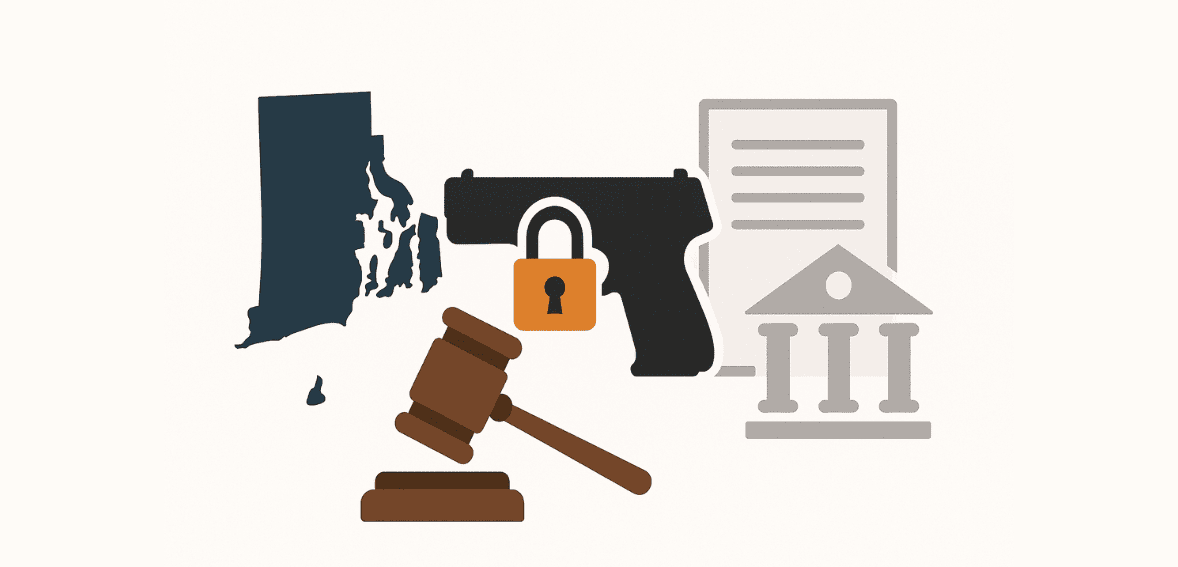
- Requires a safety course certificate and background check to purchase.
- No permit needed to own rifles or shotguns.
- Concealed carry permits issued by local police or the state Attorney General.
Maine
- Allows permitless concealed carry for residents 21 and older.
- No permit needed for open carry.
- No magazine restrictions or assault weapon bans.
Vermont
- No permit required for open or concealed carry.
- Recently added background check requirements for private sales.
- Bans high-capacity magazines and bump stocks.
New Hampshire
- No permit required for concealed or open carry.
- No assault weapon bans or magazine restrictions.
- Background checks required only through licensed dealers.
Understanding Firearm Laws for Southern States
The South has the most permissive gun policies in the country, broadly. Many states have constitutional carry, few restrictions on guns, and support self-defense rights.
Texas
- Permitless carry for handguns if 21 or older.
- Open carry allowed with or without a license.
- No magazine capacity or assault weapon bans.
- Strong Castle Doctrine and Stand Your Ground laws.
Florida
- As of 2023, allows permitless concealed carry.
- Open carry is generally prohibited.
- Has a red flag law and background check requirement.
- Bans bump stocks but not assault-style rifles.
Georgia
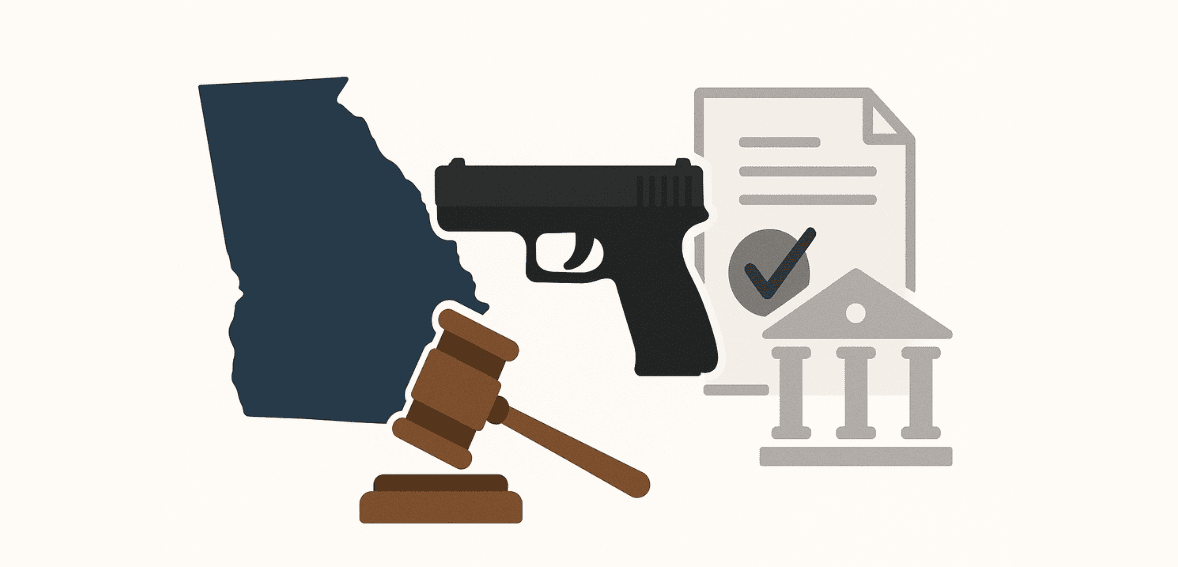
- Permitless carry for both open and concealed.
- No ban on assault weapons or magazine size.
- Strong Stand Your Ground law.
North Carolina
- Concealed carry requires a permit and training.
- Open carry is legal without a license.
- Background check required for handguns (not rifles/shotguns).
- No red flag law.
South Carolina
- Requires a concealed weapons permit (CWP) for carry.
- Open carry allowed only with a valid CWP.
- No magazine bans or red flag laws.
Alabama
- Permitless carry effective 2023.
- No assault weapon or magazine bans.
- Strong Castle Doctrine protections.
Tennessee
- Permitless carry for residents 21+.
- Permits still available for reciprocity.
- No ban on assault-style weapons or large-capacity mags.
Kentucky
- Constitutional carry state.
- No licensing required for open or concealed carry.
- No red flag laws or magazine limits.
Arkansas

- Permitless carry recognized by state AG.
- Open and concealed carry allowed without a license.
- No restrictions on firearm types or capacities.
Mississippi
- Constitutional carry in place.
- No assault weapon or magazine regulations.
- Strong Stand Your Ground laws.
Louisiana
- Requires permit for concealed carry (as of now).
- Open carry allowed without a license.
- Castle Doctrine applies in homes, vehicles, and workplaces.
Understanding Firearm Laws for Midwest States
The Midwest has a combination of strict urban gun laws and looser rules in rural areas). Some states are restrictive (Illinois), others go with constitutional carry.
Illinois
- Requires a Firearm Owner’s Identification (FOID) card to purchase or possess firearms.
- Handgun purchases require background checks and a waiting period.
- Concealed carry permit required and tightly regulated.
- Chicago has additional local restrictions.
Ohio
- Permitless carry allowed for residents 21 and older.
- No magazine capacity limits or assault weapon bans.
- Red flag legislation proposed but not passed.
Michigan
- Requires a permit for concealed carry and background checks for handguns.
- Open carry allowed without a permit.
- No state-level magazine or assault weapon bans.
- Strong self-defense laws.
Indiana
- Constitutional carry became legal in 2022.
- No permit needed for open or concealed carry.
- No magazine restrictions or red flag bans.
Wisconsin
- Concealed carry requires a permit.
- Open carry is legal without a license.
- Background checks are required through licensed dealers.
- No magazine or assault weapon bans.
Missouri
- Permitless carry
- No permit needed for open or concealed carry.
- No red flag law or magazine bans.
- Castle Doctrine and Stand Your Ground apply.
Minnesota
- Concealed carry requires a permit; open carry is allowed with the same.
- Background checks are required through licensed dealers.
- No assault weapon ban, but Minneapolis has local restrictions.
Iowa
- Permitless carry since 2021.
- Background checks are only required for dealer sales.
- No magazine restrictions or red flag law.
Kansas
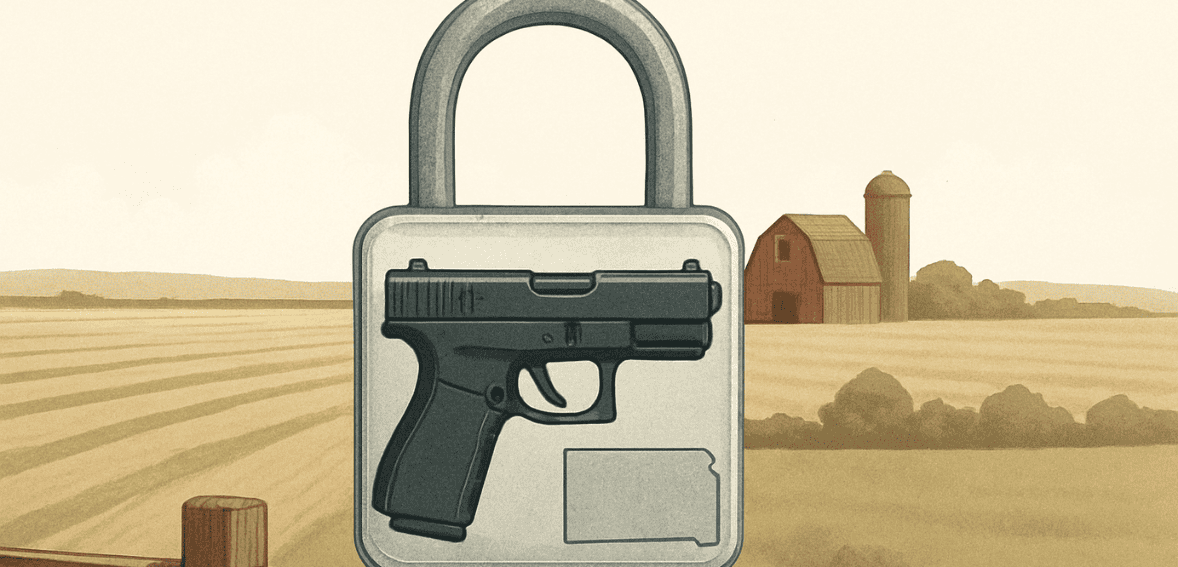
- One of the earliest constitutional carry states.
- No permit or training required for carry.
- No bans on weapon type or magazine size.
Nebraska
- The permitless concealed carry law took effect in 2023.
- Open carry is legal.
- No magazine restrictions or red flag laws.
Understanding Firearm Laws for Western States
The Western U.S. presents a wide spectrum, from very strict in places like California to extremely permissive in states like Arizona and Idaho. This region is where federalism in gun law really shows its full range.
California
- Among the strictest gun laws nationwide.
- Requires background checks for all gun and ammo sales.
- Bans assault weapons, high-capacity magazines, and some semi-automatic rifles.
- Requires a Firearm Safety Certificate to purchase firearms.
- Red flag laws, waiting periods, and mandatory safe storage rules apply.
Oregon
- Requires a permit to purchase starting in 2024.
- Bans large-capacity magazines.
- Red flag laws and background checks required for all sales.
- Open carry is legal but heavily regulated in cities.
Washington
- Requires background checks for all sales.
- Bans assault weapons and high-capacity magazines.
- Mandatory safety training for concealed carry permits.
- Strong red flag laws in place.
Nevada
- Requires background checks for all gun sales.
- No permit needed for open carry.
- Concealed carry requires a permit.
- No assault weapon ban, but bump stocks are banned.
Arizona
- Permitless carry allowed for residents 21+.
- No assault weapon or magazine bans.
- Open and concealed carry is legal without a license.
- Strong self-defense protections.
Utah
- Permitless carry for legal gun owners 21+.
- Permits still available for reciprocity.
- No magazine or weapon restrictions.
- Background checks required only via dealers.
Colorado
- Universal background checks and red flag laws in effect.
- Bans high-capacity magazines (15+ rounds).
- Concealed carry permits required; open carry allowed depending on locality.
New Mexico
- Open carry is legal without a permit.
- Concealed carry requires a license and training.
- No assault weapon bans.
- Background checks required for most private sales.
Idaho
- One of the most gun-permissive states.
- No permit required for open or concealed carry.
- No red flag laws or magazine restrictions.
Montana
- Constitutional carry state.
- Open and concealed carry allowed without a permit.
- No magazine or weapon bans.
- Strong Castle Doctrine protections.
Understanding Firearm Laws for Northwest, Alaska, and Hawaii
This final regional segment extends into the Pacific Northwest beyond the mainland and considers how Alaska and Hawaii go about regulating guns — two locations that share remoteness, but little else when it comes to approach.
Alaska

- One of the most gun-friendly states in the country.
- Permitless carry for both residents and visitors.
- No registration, magazine limits, or assault weapon bans.
- Strong Castle Doctrine and Stand Your Ground laws.
- Background checks not required for private sales.
Hawaii
- Among the most restrictive gun law states.
- Requires permits to acquire and own any firearm.
- All firearms must be registered with local law enforcement.
- No concealed or open carry without a highly restrictive license.
- Bans assault-style weapons and high-capacity magazines.
- Extensive background checks and waiting periods required.
Washington (recap from earlier section)
- Strict background check laws and red flag legislation.
- Bans on assault weapons and high-capacity magazines.
- Prohibits the open carry of firearms in specific public spaces, including libraries, zoos, aquariums, and transit facilities.
- Concealed carry permit required and available.
Top Considerations When Traveling Between States with Firearms
1. Know the Laws Before You Travel
Always research firearm laws in each state you’ll visit or pass through. Focus on:
- Carry laws (open vs. concealed)
- Transport rules
- Prohibited weapon types
- Reciprocity agreements
2. Understand Reciprocity
Some states recognize out-of-state concealed carry permits, but others don’t. For example:
- Florida honors permits from many states.
- California recognizes no other state’s permits.
Always check a reciprocity map before crossing borders.
3. Follow Federal Transport Laws (FOPA)
The Firearm Owners Protection Act (FOPA) allows legal transport of firearms between states where you can legally own them, under strict conditions:
- Firearms must be unloaded.
- Store them in a locked container, inaccessible from the driver’s area.
- Ammunition should be in a separate container.
This applies to interstate travel only—not within a single state.
4. Don’t Assume Uniform Rules at Airports
Each airport (and airline) has its own policies:
- Firearms must be declared and checked, never carried on.
- Use a hard-sided, locked case.
- Ammo may need to be stored separately.
TSA regulations apply, but local laws override once you land.
5. Special Rules for National Parks
- Firearms are allowed in national parks, but you must follow state and local laws where the park is located.
- Federal buildings within parks (like ranger stations) remain gun-free zones.
6. Be Cautious in “Gun-Free” Zones
Certain locations are off-limits to guns, even with a permit:
- Schools and colleges
- Government buildings
- Bars and restaurants serving alcohol (varies by state)
Violating these zones can result in serious charges.
7. Use Trusted Resources
Stay updated with:
- State attorney general websites
- Concealed carry apps and reciprocity tools
- NRA-ILA legal updates
How Do Federal Laws Affect State Firearm Laws?
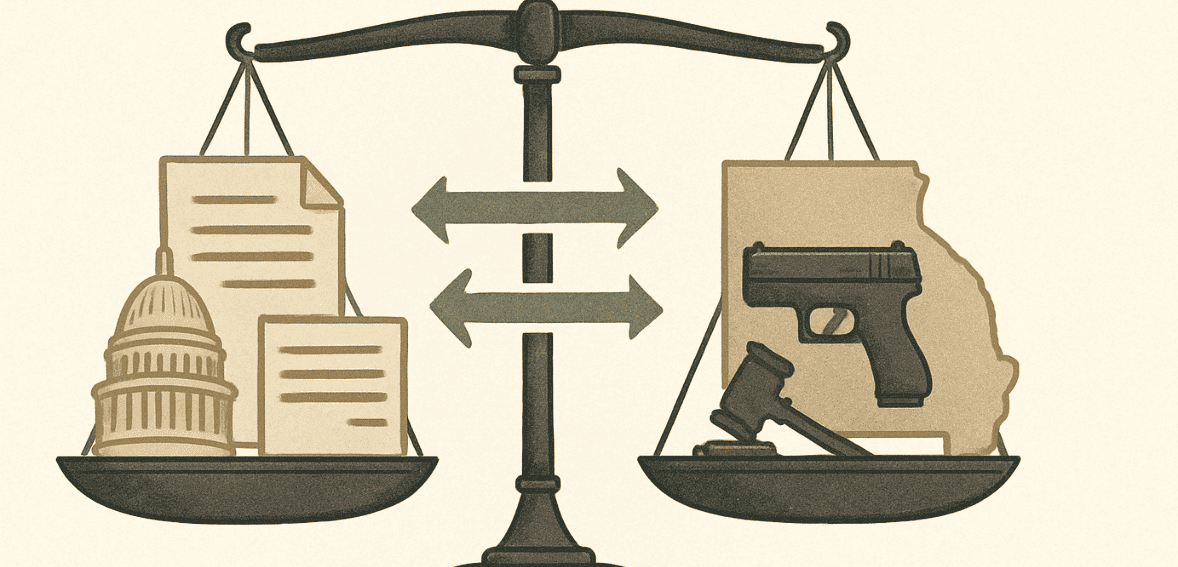
Knowing how federal firearm laws contrast with state laws is crucial for compliance. States have control of most gun policies, but the federal government sets overarching rules that apply in every state.
1. Federal Gun Law Basics
On the national level, the Bureau of Alcohol, Tobacco, Firearms and Explosives (ATF) oversees laws, including:
- Background checks through the the National Instant Criminal Background Check System (NICS)
- Prohibition of gun sales to:
- Felons
- Domestic abusers
- Undocumented immigrants
- Regulation of fully automatic weapons, suppressors, and short-barreled rifles under the National Firearms Act (NFA)
2. States Can Be More Restrictive
Federal law is responsible for setting the baseline yet state laws can go beyond that. For example:
- Federal law does not prohibit assault weapons — but California, New York and other states do.
- States can require waiting periods, registration, or limits on magazines.
So even if something is legal under federal law, your state might say no.
3. Supremacy Clause & Preemption
The Supremacy Clause says federal law prevails over state law — but only when they’re directly in conflict.
- States cannot trump federal prohibitions on certain weapons.
- But states are not required to directly mirror federal laws unless federal law expressly preempts them.
For instance, there is open carry, which isn’t addressed in federal law but might be permitted by a state.
4. Gun-Free School Zones Act (GFSZA)
Federal law prohibits the carrying of firearms within 1,000 feet of a school zone except:
- You are licensed to carry in that state, or
- You’re on private property
While state law may allow carry, violating this act can lead to federal charges.
5. Federal Firearm Licensing
Anyone who sells guns commercially must have a Federal Firearms License (FFL). Also, they must follow:
- Background check rules
- Record-keeping standards
- Age limits (must be 21+ to buy a handgun from an FFL dealer)
Private sellers, however, are regulated primarily by state law, except when selling across state lines.
6. Federal Restrictions on Certain Guns
The National Firearms Act (NFA) regulates weapons like:
- Machine guns
- Short-barreled shotguns
- Silencers/suppressors – You need to apply and pay a tax and register with the ATF to legally possess one.
7. Enforcement Gaps
Some states simply will not enforce federal laws that they oppose, leading to gray areas:
- Those laws allow local governments to pass Second Amendment Sanctuary laws.
- But federal agents still retain the authority to enforce national rules.
Conclusion
Owning a firearm involves rights and responsibilities. Laws are constantly evolving, and ignorance is no excuse when it comes to the law. Stay informed, be respectful of each state’s regulations and always keep safety and compliance at the front of your mind.
Frequently Asked Questions
1. Is it legal to bring a firearm across state lines?
Yes, but you’ll have to comply with the laws of each state along your route. The Federal Firearm Owners Protection Act (FOPA) protects you while traveling between states, but only when the firearm(s) is unloaded, locked, and stored out of the passenger area.
2. What states have the most strict gun regulations?
Five states with among the most limited firearms laws — California, New York, New Jersey, Massachusetts and Hawaii — have bans on assault weapons, limits on magazine capacity and demanding permitting processes.
3. Which states have permitless concealed carry?
Some states — including Arizona, Texas, Florida, Alaska and Montana — permit permitless (or constitutional) carry for residents and visitors, subject to certain age and eligibility conditions.
4. Does my concealed carry permit work in all states?
No. Concealed carry reciprocity is inconsistent. Some states acknowledge out-of-state permits, some do not. Check a reciprocity map before you travel.
5. Can you own a firearm in all 50 states?
Yes, all 50 states allow private citizens to own guns. But every state enacts its own rules about the kinds of firearms you may possess and the circumstances under which you are allowed to have or use them.
